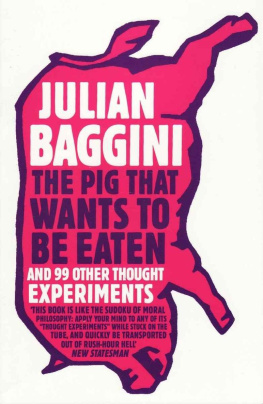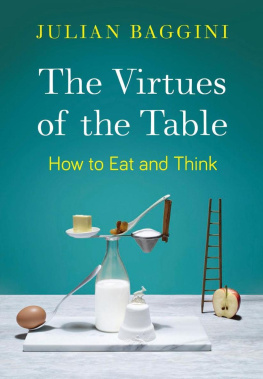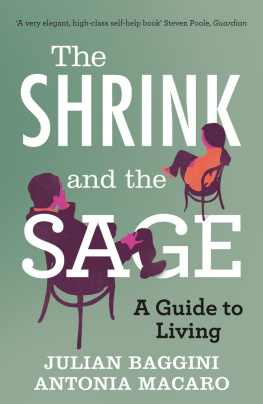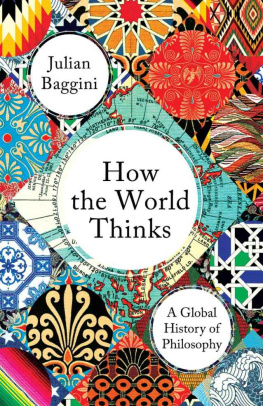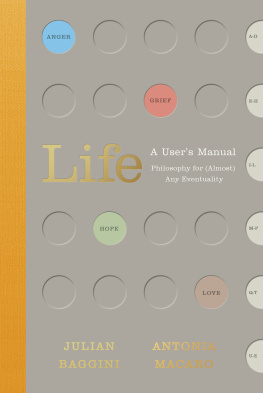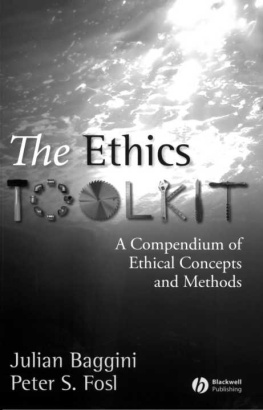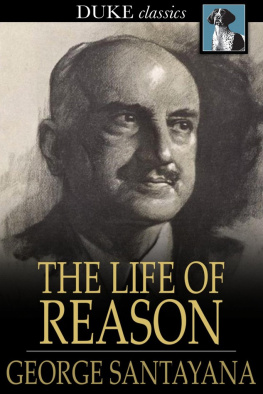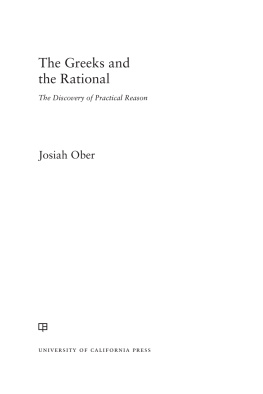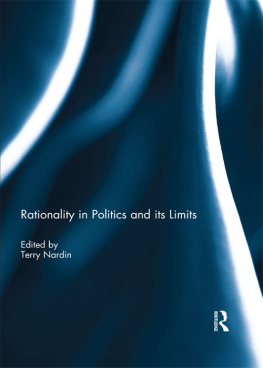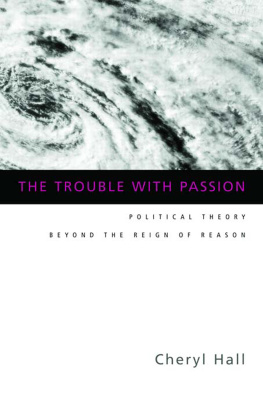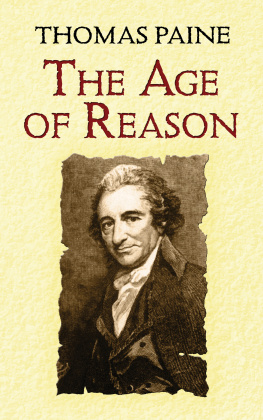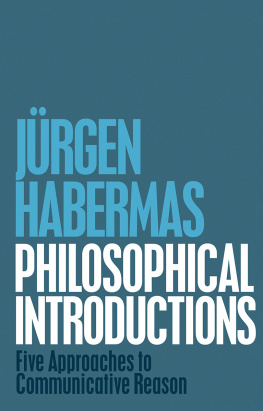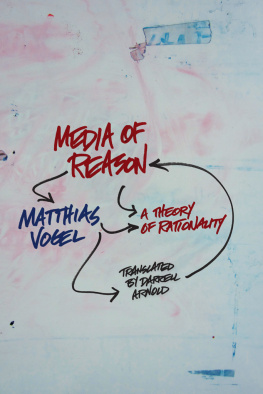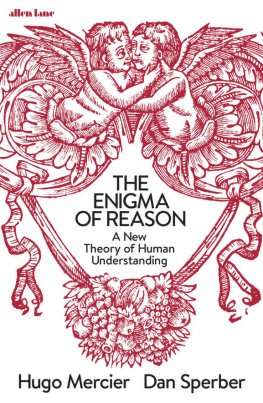

Copyright 2016 Julian Baggini
All rights reserved. This book may not be reproduced in whole or in part, in any form (beyond that copying permitted by Sections 107 and 108 of the U.S. Copyright Law and except by reviewers for the public press) without written permission from the publishers.
For information about this and other Yale University Press publications, please contact:
U.S. Office:
Europe Office:
Typeset in Minion Pro by IDSUK (DataConnection) Ltd
Printed in Great Britain by TJ International Ltd, Padstow, Cornwall
Library of Congress Cataloging-in-Publication Data
Names: Baggini, Julian, author.
Title: The edge of reason : a rational skeptic in an irrational world / Julian Baggini.
Description: New Haven : Yale University Press, 2016.
Identifiers: LCCN 2016009433 | ISBN 9780300208238 (hardback)
Subjects: LCSH: Reason. | Rationalism. | BISAC: PHILOSOPHY / Movements / Rationalism. | PHILOSOPHY / Ethics & Moral Philosophy. | PHILOSOPHY / Criticism.
Classification: LCC BC177 .B18925 2016 | DDC 128/.33dc23
LC record available at http://lccn.loc.gov/2016009433
A catalogue record for this book is available from the British Library.
10 9 8 7 6 5 4 3 2 1
In memory of my father, Lino Baggini. This was the book he most wanted me to write.
Contents
Acknowledgements
This books brings together and develops ideas that I first explored in various journal articles, conference papers and book chapters. I am grateful to all those who have given me the opportunity to develop my thinking, and I apologise if the following list leaves anyone out: Russell Blackford, Havi Carel, Catherine Fieschi, David Gamez, Alastair Hannay, Volker Kaul, Chad Meister, J.P. Moreland, Rachel OBrien, Anthony OHear, Udo Shklenk, J.B. Stump, A. Sweis.
Richard Newhausers enthusiasm for an earlier iteration of this project was critical to its eventual completion and I am only sorry we could not work on it together. At Yale University Press, I am indebted to Melissa Bond, Rachael Lonsdale and Heather McCallum. I am also grateful for Lizzy Kremers solid and consistent support. The rock at the base of it all is, as ever, Antonia.
Introduction
We have lost our reason, and our loss is no accident. Gradually, the contemporary West has become more and more dismissive of the power of reason. Caring for it less, we often find we have carelessly left it behind. When we do try to use it, were not quite sure how to do so. We have become suspicious of its claims, unwilling to believe that it can lead us to anything worthy of the name truth.
Once outr dismissals of reason have become the new common sense. Once radical claims like People who lean on logic and philosophy and rational exposition end by starving the best part of the mind now feature in many collections of inspirational quotes (attributed to W.B. Yeats). Our image of the typical human being is now like Dr Nathan in J.G. Ballards The Atrocity Exhibition, for whom reason rationalizes reality for him as it does for the rest of us, in the Freudian sense of providing a more palatable or convenient explanation.
In the popular imagination, reason has ceased to be a universally admired faculty and is portrayed as the enemy of mystery and ambiguity, a cold tool of desiccating logic. It is seen as standing in opposition to emotion, denying the role of feeling and sentiment in daily life. Rationality is dismissed as a tool of hegemonic oppression, a patriarchal construct, a Western imposition or a mistaken privileging of one hemisphere of the brain over the other. The Enlightenment is no longer almost universally revered but often condemned as the birth of the age of dehumanising industrial capitalism, the start of the road that led to Auschwitz. Popular culture has absorbed bastardised versions of many of these ideas, and it is now widely believed that we are guided more by genes, manipulative corporations and unconscious psychological biases than we could ever be by reason.
It was not always thus. For millennia, rationality was held up as the highest human achievement. We once followed Aristotle in maintaining that the capacity to reason is what sets us apart from the other animals. Reason was not the cold hard enemy of warm-blooded virtues like love, faith or aesthetic appreciation. St Augustine, for instance, said we could not even believe if we did not have rational souls.
We have always recognised that irrational impulses can take a grip on us, but it was believed that, with effort and application, our better, rational selves could reign sovereign over the soul. Plato, for instance, said that Its not at all uncommon to find a persons desires compelling him to go against his reason, and to see him cursing himself and venting his passion on the source of the compulsion within him. Yet he insisted, Im sure you wont claim that you had ever, in yourself or in anyone else, met a case of passion siding with his desires against the rational mind, when the rational mind prohibits resistance.
It is true that we have in the past often placed too much trust in our capacity to think rationally and that a greater recognition of the limits of reason is necessary and welcome. But it is not for nothing that losing your reason means to go mad. Reason needs to be put in its place, and if that place is not close to the centre of human life then our minds are left rudderless to float this way and that on the waters of whim, emotion and the influences of others.
The book is an attempt to help us recover our reason. To do this we have to understand what reason really is. This is a curiously neglected question. There is a great deal written about particular forms of reason, such as deductive logic and inductive inference, but much less on what reason, in the most general sense of the word, involves. This lacuna is reflected in the fact that we have two words reason and rationality which lack agreed, precise philosophical definitions and are in practice synonyms. (I will use the two interchangeably.)
The rehabilitation of reason is urgent because it is only through the proper use of reason that we can find our way out of the quagmires in which many big issues of our time have become stuck. Without a clear sense of what it means for one point of view to be more reasonable than another, it seems that the position one adopts is ultimately based on nothing more than personal opinion or preference. People take sides in debates not on the basis of evidence or argument but on the basis of the side where they feel more at home. What is best for the economy? Either what Wall Street wants or what it doesnt, depending on which faction you belong to. Are human beings responsible for global warming? Just see what big business or progressives are saying and back your horse accordingly. If science appears to challenge your faith, then either reassure yourself that science has nothing to do with religion or take solace from the sizeable minority of scientists who are religious. In all these debates people offer reasons for their positions but, whatever they say, dissenters can tell themselves they would say that and ignore them.
Most worryingly, a lack of faith in the power of reason makes good international relations seemingly impossible. When we give up on reason, the only tool we have left is coercion. For instance, The brutality of terrorists in Syria and Iraq forces us to look into the heart of darkness, said one senior American politician. The only language understood by killers like this is the language of force. That politician was not a notorious hawk but President Barack Obama, often criticised for not being forceful enough in exerting American power in the world. Obama saw a role for reasoned diplomacy in the Middle East and even in Afghanistan, but that did not make him popular. Since reason has become a debased currency, it is no surprise that fewer and fewer believe it has any value when dealing with threatening foreign powers.
Next page

